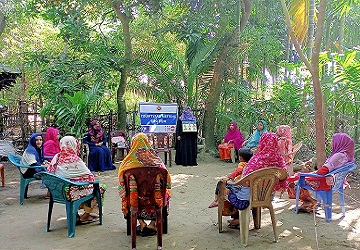Emergency Response
RTMI stands as a trusted leader in emergency preparedness and response, with a proven track record of addressing the
urgent needs of disaster-prone and crisis-affected regions. The organization’s expertise encompasses a comprehensive range of
interventions designed to alleviate human suffering, restore dignity, and build resilience in vulnerable populations.
Since
2007, RTMI has been actively involved in emergency operations in the Rohingya refugee camps of Kutupalong and Nayapara, offering lifesaving
services to displaced populations. In response to the 2017 influx of over 700,000 Rohingya refugees fleeing violence in Myanmar, RTMI rapidly
scaled up its efforts. As one of the first responders, the organization provided critical humanitarian aid, established health service hubs,
and coordinated efforts to support the rapidly expanding refugee settlements.
RTMI’s emergency response programs are anchored in the delivery of essential primary healthcare services. These include outpatient consultations, maternal and child health services, immunization campaigns, and the management of communicable diseases. Mobile health units are deployed to reach underserved and hard-to-access areas, ensuring that no one is left without care during emergencies.
Recognizing the profound psychological impact of crises, RTMI incorporates mental health support into its emergency interventions. The organization provides counseling, psychosocial support, and capacity-building for local healthcare providers, enabling them to address trauma and mental
health challenges in affected communities.
Emergencies often exacerbate risks of gender-based violence (GBV). RTMI integrates GBV prevention and response into its programs, offering safe spaces, counseling services, and referral mechanisms for survivors. Training and awareness campaigns are conducted to educate communities and reduce stigma, fostering a culture of protection and respect.
Preparedness is key to minimizing the impact of disasters. RTMI engages in disaster risk reduction (DRR) activities, including early warning systems, community training, and the development of contingency plans. By
strengthening health systems and building local capacity, the organization ensures communities are better equipped to withstand and
recover from future crises.
In emergencies, time is of the essence. RTMI’s dedicated teams are trained for rapid deployment, ensuring that critical services are delivered swiftly and efficiently. The organization works closely with government agencies, UN bodies, and international partners to coordinate efforts,
avoid duplication, and maximize impact.
RTMI’s impact in the Rohingya camps extends beyond immediate relief. Over the years, the organization has established resilient healthcare systems, including clinics and mobile units, tailored to the unique needs of displaced populations. Innovations such as bio scope presentations and
culturally sensitive outreach have enhanced community engagement and improved service uptake.
RTMI’s
emergency response is guided by a commitment to humanity, impartiality, and sustainability. By integrating immediate relief with long-term
resilience-building, the organization not only alleviates suffering but also lays the groundwork for recovery and stability.
From disaster-prone regions to crisis-affected populations, RTMI remains steadfast in its mission to save lives, restore hope, and rebuild
futures.
-
Current Information
-
Activities Pictures
RTM International are implementing Health Support and research activities in the different Districts of Bangladesh which are funded by different Donors.
RTMI-UNFPA Project

Courtyard meeting organized by RTMI-UNFPA
